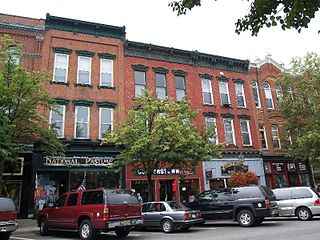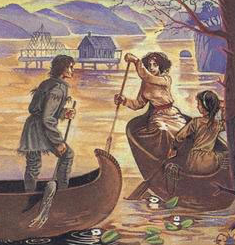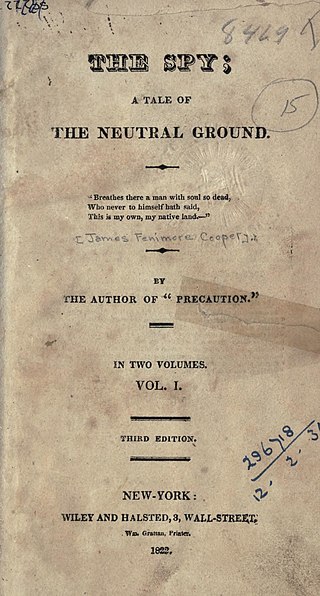Related Research Articles

The Pulitzer Prize for Fiction is one of the seven American Pulitzer Prizes that are annually awarded for Letters, Drama, and Music. It recognizes distinguished fiction by an American author, preferably dealing with American life, published during the preceding calendar year.

The Pulitzer Prize for History, administered by Columbia University, is one of the seven American Pulitzer Prizes that are annually awarded for Letters, Drama, and Music. It has been presented since 1917 for a distinguished book about the history of the United States. Thus it is one of the original Pulitzers, for the program was inaugurated in 1917 with seven prizes, four of which were awarded that year. The Pulitzer Prize program has also recognized some historical work with its Biography prize, from 1917, and its General Non-Fiction prize, from 1962.

Cooperstown is a village in and the county seat of Otsego County, New York, United States. Most of the village lies within the town of Otsego, but some of the eastern part is in the town of Middlefield. Located at the foot of Otsego Lake in the Central New York Region, Cooperstown is approximately 60 miles southwest of Albany, 67 mi (108 km) southeast of Syracuse and 145 mi (233 km) northwest of New York City. The population of the village was 1,794 as of the 2020 census.

Richard Powers is an American novelist whose works explore the effects of modern science and technology. His novel The Echo Maker won the 2006 National Book Award for Fiction. He has also won many other awards over the course of his career, including a MacArthur Fellowship. As of 2023, Powers has published thirteen novels and has taught at the University of Illinois and Stanford University. He won the 2019 Pulitzer Prize for Fiction for The Overstory.
This article contains information about the literary events and publications of 1985.

James Fenimore Cooper was an American writer of the first half of the 19th century, whose historical romances depicting colonial and indigenous characters from the 17th to the 19th centuries brought him fame and fortune. He lived much of his boyhood and the last fifteen years of life in Cooperstown, New York, which was founded by his father William Cooper on property that he owned. Cooper became a member of the Episcopal Church shortly before his death and contributed generously to it. He attended Yale University for three years, where he was a member of the Linonian Society.

Kevin Baker is an American novelist, political commentator, and journalist.

Stephen Harrigan is an American novelist, journalist and screenwriter. He is best known as the author of the bestselling The Gates of the Alamo, for other novels such as Remember Ben Clayton and A Friend of Mr. Lincoln, and for his magazine work in Texas Monthly.

Nathaniel "Natty" Bumppo is a fictional character and the protagonist of James Fenimore Cooper's pentalogy of novels known as the Leatherstocking Tales.
William Sheldon Dudley is a naval historian of the United States Navy, who served as Director of Naval History and Director, Naval Historical Center, Washington, D.C. from 1995 to 2004.

Harold Holzer is a scholar of Abraham Lincoln and the political culture of the American Civil War Era. He serves as director of Hunter College's Roosevelt House Public Policy Institute. Holzer previously spent twenty-three years as senior vice president for public affairs at The Metropolitan Museum of Art in New York before retiring in 2015.
Nancy Horan is an American author of historical fiction. Her works include Loving Frank, a novel about Mamah Borthwick and her relationship with American architect Frank Lloyd Wright, and Under the Wide and Starry Sky, a novel about the relationship between Robert Louis Stevenson and his wife. Horan was awarded the 2009 James Fenimore Cooper Prize for Best Historical Fiction by the Society of American Historians for Loving Frank.
Thomas Mullen is an American novelist.

The Spy: a Tale of the Neutral Ground is a novel by American writer James Fenimore Cooper. His second novel, it was published in 1821 by Wiley & Halsted. The plot is set during the American Revolution and was inspired in part by the family friend John Jay. The Spy was successful and began Cooper's reputation as a popular and important American writer.
Maria W. Tippett is a Canadian historian specialising in Canadian art history. Her 1979 biography of Emily Carr won the Governor General's Award for English-language non-fiction.
The Society of American Historians, founded in 1939, encourages and honors literary distinction in the writing of history and biography about American topics. The approximately 300 members include professional historians, independent scholars, journalists, film and documentary makers, novelists, poets, and biographers, all of whom were selected for membership based on the literary excellence as well as the intellectual strength of their writing or presentation of American history.

Nautical fiction, frequently also naval fiction, sea fiction, naval adventure fiction or maritime fiction, is a genre of literature with a setting on or near the sea, that focuses on the human relationship to the sea and sea voyages and highlights nautical culture in these environments. The settings of nautical fiction vary greatly, including merchant ships, liners, naval ships, fishing vessels, life boats, etc., along with sea ports and fishing villages. When describing nautical fiction, scholars most frequently refer to novels, novellas, and short stories, sometimes under the name of sea novels or sea stories. These works are sometimes adapted for the theatre, film and television.
Afloat and Ashore is a nautical fiction novel by James Fenimore Cooper first published in 1844. Set in 1796–1804, the novel follows the maritime adventures of Miles Wallingford Jr., the son of wealthy New York landowners who chooses to go to sea after the death of his parents. The novel ends abruptly part way through, and is followed by what critic Harold D. Langely called a "necessary" sequel which resolves many thematic and plot elements. The novel is partially autobiographical, based in part on Cooper's own experiences as a sailor, and is his first full-length novel to fully employ a first-person narrative.

Mercedes of Castile; or, The Voyage to Cathay is an 1840 historical novel by James Fenimore Cooper. The novel is set in 15th-century Europe, and follows the preparations and expedition of Christopher Columbus westward to the new world.
Lynne Bowen is a Canadian non-fiction writer, historian, professor, and journalist, best known for her popular historical books about Vancouver Island and British Columbia. Over the years, Bowen has won awards such as the Eaton's British Columbia Book Award (1983), the Lieutenant Governor's Medal for Writing British Columbia History (1987), and the Hubert Evans Non-Fiction Prize (1993).
References
- ↑ Society of American Historians Prize for Historical Fiction (formerly known as the James Fenimore Cooper Prize)
- ↑ "The Society of American Historians". Columbia University . Retrieved 2012-04-17.
- ↑ Tabor, Mary B. W. (1995-05-10). "Book Notes". New York Times . Retrieved 2012-04-17.
- ↑ Dreifus, Erika (2012-01-19). "Improve your chances of winning a contest". Writer magazine . Retrieved 2014-01-16.
- ↑ "Society of American Historians: James Fenimore Cooper Prize". Columbia University . Retrieved 2015-05-12.
- ↑ "Society of American Historians: James Fenimore Cooper Prize". Columbia University . Retrieved 2017-05-23.
- ↑ "Society of American Historians: James Fenimore Cooper Prize". Columbia University . Retrieved 2019-05-07.
- ↑ "official website" . Retrieved 2021-05-09.
- ↑ "official website" . Retrieved 2023-05-16.